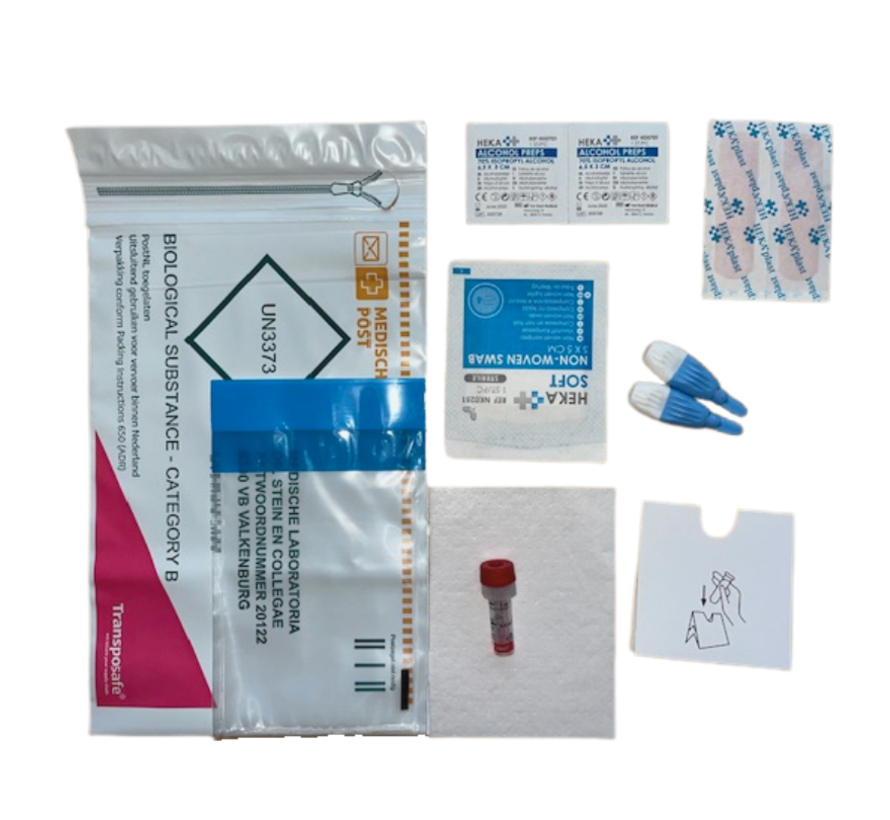Blood Testosterone - Finger Prick
This blood test measures the amount of testosterone in the blood.
Due to fluctuations due to day and night rhythms, morning blood sampling is recommended (approximately from 7:00 am to 10:00 am) to compare results. Want to know more about testosterone and our testosterone test? Then read on quickly.
About Testosterone
Testosterone is the male sex hormone made in men primarily in the testes. It stimulates the development of male sex characteristics such as the low voice, penis growth, body hair and muscle development. It also stimulates sex drive and provides firm bones.
Testosterone is also made in the adrenal glands (in both men and women) and in small amounts in the ovaries (in women). Want to know what your testosterone level is? Then take the testosterone test.
Testosterone regulates much more than sex drive
Men can do a lot themselves to boost their testosterone levels. Testosterone keeps a man's body healthy for a long time. In fact, the hormone has a lot to do with memory, osteoporosis, mood and cardiovascular disease.
Older men with low testosterone have a higher chance of dying. Although it has not yet been hard proven, studies suggest that older men with relatively high testosterone levels have more energy and are less prone to diseases of old age.
Several problems
Testosterone production slowly declines with aging. Because testosterone is at work everywhere in the male body, this means that a deficiency in the hormone can also cause several problems.
From memory to bones
In the blood of a healthy man, the concentration of testosterone fluctuates between 11 and 30 nanomoles per liter daily. Starting in their 40s, men may notice a slight decrease in their muscle strength and muscle mass. This is very gradual. Short-term memory will slowly but surely begin to function slightly less well, and later in life the desire for sex decreases somewhat. Problems with sleeping can also occur. There is a link between low testosterone and osteoporosis, but it is still unclear if low testosterone causes osteoporosis or if it is a consequence of it.
Metabolic syndrome
Low testosterone is also often seen in combination with what is known as metabolic syndrome. That syndrome is a combination of factors that can lead to cardiovascular disease. These include high blood pressure, excessive cholesterol, unfavorable blood sugar levels, arteriosclerosis and (extreme) obesity. Again, it is not clear if low testosterone levels cause all this or if it is just a consequence. The real culprit may be fat stored around organs.
Organ fat
A growing body of research shows that deep belly fat negatively affects blood sugar and cholesterol levels. Deep belly fat or organ fat converts testosterone into the female hormone estrogen, which further promotes fat storage. As fat mass increases and muscle mass breaks down, the body becomes less sensitive to insulin and the risk of type 2 diabetes increases. Most men can reduce or even reverse this process for the better. They can revive their testosterone production by changing their lifestyle.
So, reason enough to take this testosterone test and learn more about your current testosterone level.
Penopause
In women entering menopause, hormone levels change relatively quickly. This menopause does not really have a male counterpart. In men, it is sometimes referred to as penopause or andropause when blood testosterone levels no longer exceed 12 nanomoles per liter. Deficiency occurs in nearly 1 in 10 men between the ages of 40 and 79. All kinds of symptoms can arise, but they are not always noticed or associated with low testosterone. The main complaints are decrease in libido, depressive feelings and osteoporosis.
Please note in the comments box at check out if there is no anabolic use. We can then call you back if the results are elevated.
The maximum testosterone value reported is: >510 nmol/L.
















